Timothy Coggeshall
Editors' note:
We are very sorry to note the passing of Tim Coggeshall on January 23, 2018 at the age of 95. Please read Head of School Catherine Hall’s tribute below and if you haven’t already read our own tribute, please consider doing so, even if you’ve read it before. Those who attended our 50th will recall how spirited and gracious he was. We were indeed fortunate to have had him as a mentor, teacher, and friend.
Timothy Coggeshall
Please click here for a photo gallery collection of Tim's career at Nobles. Click here to view former Nobles faculty member Jim Bride's November 2010 video interview with our former teacher.
Dear Members of the Nobles Community,
Tim taught at Nobles from 1947 to 1987. His contributions as a teacher, scholar, colleague and friend are innumerable. He touched the lives of hundreds of students in the classroom, on the playing fields and in the dormitory. He taught English and history, served as community service director, admission director, ski coach, Nobleman advisor and so much more. Tim graced the Nobles family with his warmth and wit. He worked closely with four of the school’s seven heads in different capacities. He modeled everything that is best in the Nobles faculty, inspiring the establishment of the Coggeshall Award for teaching excellence.
Tim touched many lives during his time at Nobles and beyond. While we will publish a full obituary honoring Tim in the spring issue of the school magazine, I wanted to share this news with you right away. Our community has lost a legend, and I know many of you have lost a dear friend.
Tim is survived by daughters Lindy, Nan, Melora and Caroline ՚76 as well as his brother, Clarke, his sister-in-law Eddie, 11 grandchildren, seven great-grandchildren and many nieces, nephews, grandnieces and grandnephews. Condolences may be sent to Caroline at the following address:
Caroline Coggeshall
158 West Canton Street
Boston, MA 02118
Please note that a celebration of Tim’s life will take place in Barnstable in June, and we will share further details when they become available.
Sincerely,
Catherine J. Hall, Ph.D.
Head of School
Tim's Career and Beyond
Timothy Coggeshall began his teaching career at Nobles in 1947, and for the next forty years he touched the lives of hundreds of students in the classroom, on the playing field and in the dormitory. He taught us English and History, as well as single-wing football and more. For more than 70 years Tim graced the Nobles family with his warmth and wit, and he was a Reunion favorite.
After retiring from Nobles, Tim lived in his beloved home in Barnstable, on Cape Cod, and remained an avid sailor.
The following quotes are excerpts from an interview of Tim Coggeshall conducted in November of 2010 by Jim Bride, documentarian, former Nobles faculty member and President of Bride Media. They are presented here with his kind permission.
First impressions
I never heard of Nobles until I finished my graduate school program [Harvard], a master’s degree in American history, after World War II and after I’d served in the Navy for three years during the war. I was graduating from college back in 1943, and I was looking for a job. I had a neighbor here on Cape Cod, Barnstable, Henry Kittredge, who had gone to Nobles, and he was not director but the presiding head, at that time, of St. Paul’s School in Concord, New Hampshire. He was a man I had enormous respect for. He said, “Get an interview with Nobles and see what they think.” So I called up and made an appointment.
I had a wife [Luby] and very young baby back on Cape Cod. As I went down, drove through the woodland, I came in through the Nobles front entrance, which was open, the old front entrance off of Bridge Street, through the woodland. Suddenly there was a river on my left and a castle on a hill on my right. The first living thing to greet me was a dog whose name I later discovered was Baron. And as soon as I heard that, I thought that was a good omen because my destroyer, in World War II, was the USS Baron.
The job interview
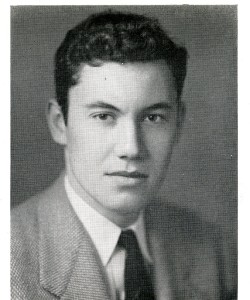 And Eliot Putnam, [Headmaster 1943-1971] gave me a very, very fine greeting. Mrs. Sawyer - who I later discovered was the only secretary for Noble and Greenough School at that time - led me upstairs, through the dark Castle passages, to a library/study at the end of the building, the opposite end from the kitchen facilities. There I was interviewed by Putnam, who initially seemed a rather austere gentleman. But he very quickly put me at ease. Certainly his manner was very informal and very friendly. And I discovered that the only opening they had was for English. So I had to very quickly skip my enthusiasm for American history. And he asked me what my credentials were for teaching English and I told him, “Well, I had gone to Philips Exeter Academy."
And Eliot Putnam, [Headmaster 1943-1971] gave me a very, very fine greeting. Mrs. Sawyer - who I later discovered was the only secretary for Noble and Greenough School at that time - led me upstairs, through the dark Castle passages, to a library/study at the end of the building, the opposite end from the kitchen facilities. There I was interviewed by Putnam, who initially seemed a rather austere gentleman. But he very quickly put me at ease. Certainly his manner was very informal and very friendly. And I discovered that the only opening they had was for English. So I had to very quickly skip my enthusiasm for American history. And he asked me what my credentials were for teaching English and I told him, “Well, I had gone to Philips Exeter Academy."
I had three superb courses [at Harvard]. Ted Spencer's Shakespeare course - I dashed through Shakespeare’s all those plays - he’s a renowned poet on his own merits. That was one course. Another was The Bible as Literature by Jimmy Munn, who had taught my father, during World War I. Before the Americans got in the war and my dad left Harvard to serve for America. And that was interesting to have shared that experience with my father. And the third course was with Wallace Stegner, young man, Ph.D., a student section teacher, in a course where you could write anything you wanted to and discuss it, and he was a superb teacher. Later he became a renowned American novelist. The Big Rock Candy Mountain is certainly one of his early and most famous books. But he was a celebrated writer for several decades many decades after that. Those were my only credentials.
Apparently Putnam heard enough. He hired me on the spot. I had no word of a contract. I was simply asked to show up for school a day before it started for an English department meeting. And I never did have a contract at Nobles until-- in the Putnam era, you simply showed up the first day of school and expected to receive a salary. And that worked for me very well.
Welcome to Nobles
The first class I attended, after watching Putnam welcome the new students in September to the school, was with young Dick Flood Jr, N'53 who was going to enter my VI English class. He was 12 years old. As I was going down to room ten, there he was standing in the doorway he shook my hand and said, “Welcome to Nobles, sir.”
Getting to know Nobles and Jim Bird
I quickly discovered that I had a contemporary on the faculty, George Bird, [G. K. Bird, N'39] whose classroom was directly next to mine and only a year older than I was. And he had attended the school in the 1930s. And I remember a few things he told me. But basically he had arrived at the school after he graduated from Amherst College in 1943. He was indispensible in those years during the war when Nobles had lost so many important teachers to the armed services. And Jim told me that Grandin Wise had gone into the Army and that Richard Flood Sr., N'23 had gone into the Navy. And let’s see. Bob Warner had gone into the Army paratroopers, the Air Force paratroopers. So they were desperate for teachers. But somehow Putnam had managed to continue the school that Mr. Wiggins had established when the school moved out to Dedham in the 1920s.
The school was much the same under Putnam, Jim [Bird] told me, as it had been under Mr. Wiggins, a small school, six years, boys, all boys, small classrooms, perhaps 12, 13, 14 students per classroom, a standard classical kind of education, Latin for the youngsters, the canon of literature for the older students. And I quickly acclimated to that. But the early Putnam years were basically an extension of the Wiggins era according to Jim, a small, friendly school that certainly served its clientele, the Brahmin clientele, very well for almost 100 years.
Morning Assembly
I discovered, from Jim [Bird], that Putnam had inherited from Mr. Wiggins, Charles Wiggins, a notebook that he had assembled with readings to read at the school. I very quickly became acquainted with some of these. I’m actually gonna read these words because they’re so important. [TC recorded reading the 'Tall Gentleman'] But they’re words that that kind of document the real business of living that these children were going to go into as they became adults. “The concepts of duty and honor, country, compassion, truth, service, integrity, honesty,” he wanted to inculcate for [Wiggins] son-in-law [Putnam] who was now attempting to do in the year in which I joined the school. I do remember one of them that Putnam would read frequently, certainly once every year. “The true test of a man’s character was how he would behave if he knew that he would never be found out.” The mind is important. And you gotta train the pupil’s mind. But... the notion of character was front and center.
On Eliot Putnam
I quickly became familiar with Putnam’s style. He was very much in charge. He reminded me of a naval captain of a warship, in command, at the helm, making all the important decisions on his own. He exuded authority. He was always there. In contrast, I’d been interviewed with Belmont Hill, where Fred Hamilton’s major function had been raising money. And Putnam’s major function was to be at the helm. He certainly was not an innovator. He clung to the tried and true. Certainly the thing dearest to his heart was the molding of character of these youngsters that would be in the school’s charge for the years that they were there.
Putnam... even though he could be intimidating,... had a reassuring, friendly manner. He would... use the word ‘fella.’ And he would put his arm on a boy’s shoulder or a colleague’s shoulder and look them right in the eye. And there was a certain warmth which certainly softened the austerity that you might see initially.
On Dick Flood, Sr.
In contrast, Dick Flood Sr., [N'23] who was the assistant headmaster and whom I got to know well, particularly when I got opportunities to teach history courses several years later, although I continued to teach English throughout my four years at Nobles. Dick Flood N'23 was the quiet catalyst behind the scenes. And he was the innovator, and he was a man who stayed in touch with the trends in American education and managed some of these things that were incorporated as the years went by. In particular, I know the people that he associated with, that he knew well and often who were to talk about education for youngsters. They were Bill Bender, at Harvard, a key figure there in the admissions department; down from Exeter, Henry Bragdon, whom he had known at Brooks School and was the head of the history department at Exeter. Third was Henry Chauncey who was the director of the educational assessing services [ETS], which was certainly very much in touch with what should be happening in American education, at this level, the secondary schools, as it evolve. He was a tremendous contributor to the school in the decades ahead.
On the role of a schoolmaster
You had a 24-hour job particularly if you lived on campus and especially for an English teacher. Because you always had preparation to do, papers to correct and conferences with the students. And, of course, your afternoon commitment down on the playing fields if you were reasonably vital still. It was just part of the package. And I, for one, thrived on it. Certainly my colleagues did. It understood [JHB insert] school mastery is one of those things that you got kinda spiritual dividends from. And you might not know the impact you had on a youngster at that time. But you had faith that somehow some of what you were trying to inculcate, having them live worthwhile lives eventually, somehow made those long, long hours, well, easy to take. But it was exhausting, and I must confess. I enjoyed my holidays.
On sports at Nobles
Sports were an important part. Every boy was required to attend sports every season. The younger students had the Mohawks and the Oneidas intramurals. I think we played one or two outside games. I actually helped coach the youngest boys in football, which was required of every fifth-class and sixth-class student.
The Mohawks and the Oneida Indians in football, they would wear a blue shirt with the Mohawks with white stripes on the sleeves and the Oneida across the front. And we would play a couple of games every week. And every boy was expected to play just as much as every other boy, pretty nice concept for education. So it wasn’t just confined to the better athletes.
Putnam was somewhat skeptical of the importance of idle time, especially when a youngster could drift into mischief. So even during the interim seasons, we had athletics required. And in the fall, after the football season and before the river froze, we moved in for basketball or wrestling. Everybody in school, in the upper-four grades, played touch football games every day with faculty as the referees. The younger students were playing soccer in abbreviated two-month two-week soccer season after the long fall of midget football.
In that interim season we had in the spring, the decathlon. The school had track once upon a time. But that had been abandoned, during the war, when the old wooden track froze up in the wintertime and was demolished. But that tradition carried on. And the decathlon, perhaps the feature event, was the race around the circle, which is a loop between the castle terrace and the gymnasium front steps from start to finish. Boys were very competitive. Their times improved each year, and the records were really quite remarkable.
One of the events was the shot put, which took place in the cage, which had a dirt floor. It was used for indoor baseball practice and where the squash courts were in later years. The shot put-- I remember one dramatic moment when somebody was putting a shot. Wilbur Storer, who was a new director of athletics and, for several years, a football coach and a superb wrestling coach, in all the years he was at the school, he was out there to measure the shot. And one bounced off his head. He was startled but not wounded. The boy was traumatized, but Will’s only comment was, “Well, that’s pretty good aim, fella.”
On Fine Arts
A course was introduced, required of all seniors exposing them to fine arts. And there were two remarkable teachers in the late ‘50s and early ‘60s who presided over that course. It continued for a number of years and it added a whole new dimension to a Nobles education. I actually audited it. The two teachers were Dick Van Kleeck (Nobles 1945) who had been at Nobles during those war years and come back as a teacher for a number of years at the school, a fascinating human being and a very a splendid teacher. And Paul Longland who had been an exchange teacher from England who came to the school on the regular faculty, and he continued to offer that course as long as it was at the school.
Perhaps my most interesting personal experience was going to Putnam [regarding the Fulbright English Teacher UK Exchange Program]. I had heard from Dick Flood [Jr.] the one I’ve referred who greeted me at the first class I ever taught at Nobles, who had gone on to Williams College and was teacher at Westminster, had gone on the Fulbright program to England in 1960. And I decided after hearing his experience this was something I wanted to do. I asked Mr. Putnam who encouraged me to apply. with my wife’s help she took our entire family into the Fulbright headquarters in Washington D.C. and said we want to go. And they must have heard her. She must have been eloquent because I got my contract to go to Oakham School in England [1961-62], in Rutland, England. [Jim Bride followed Tim's footsteps on a Fulbright Teacher Exchange to Oakham in 1975-76].
And I remember at that time before I left I had been for a few years, five to six years starting my 40-year program of taking boys and girls in the summer time on my 'Dauntless' cruises, sailing cruises of a week long, along the New England coast. I must have had two or 300 Nobles boys and later girls. In fact I must have had 10 or 15 older Nobles boys and girls as my first mates in those cruises. But we were sailing along Egamon Reach near Deer Isle, Maine, and I spotted Putnam down sitting on a rock at the beach, and I anchored the boat. And I rowed ashore and joined him there. And, of course, he was astonished to find me coming into the Wiggins home, which was his summertime retreat, the one time he was away from his school responsibilities.
And I sat down on a rock next to him and we talked about what kind of experience I might anticipate. It was probably the best talk I ever had with him. Perhaps as he was retiring, I had several chats that had the same intensity. But I was about to embark on this great Fulbright Teacher Exchange adventure, and he was wishing me Godspeed. And it was a very special moment in my life. It was a transforming experience not only for me but for my wife and our four daughters to be exposed to a culture that spoke more or less the same language but certainly in many educational ways a very, very different experience from teaching at Nobles.
On the Vietnam Era and change at Nobles
In 1969, I believe, the Cambodia crisis and the Vietnam War, which had lingered on for many years now, there was more and more skepticism in the country about the latest expansion of that war. It hit the college campuses hard and it soon percolated down to the schools. And Milton Academy and Nobles handled it in very different ways. I had a daughter at Milton at the time. And there were not girls yet at Nobles, and so their school shut down, as I recall, for several weeks. And while she twiddled her thumbs at home and Putnam [Milton ‘25] did talk to the school about the situation. I think we broke up into perhaps one period of small discussion groups. But he made it quite clear that he felt it was the school’s mission, our mission was education and that these could be matters of great national concern, but we would stick to our own knitting and that’s the way we decided to handle it.
And, of course, in the next several years the restlessness in the college campuses and the desire to have a greater role in the own education percolated down to the schools.
You know, the ancient Greek concept of the sound mind and a sound body combined, that’s part of the ethos of the school. But also the opportunity to have some other kinds of experience we can certainly fit and yet continuing the strong athletic tradition. Putnam watched and listened. It was a different world. I think he was tired. The hair grew longer every day of students and some of the teachers. And, I think, it was time pretty soon to move along.
On Eliot Putnam's retirement
It was time to say goodbye to Putnam. And I can remember when he left the school, I think it was just about the time he did, that I wrote a letter that I labored over. And all I remember from the letter that he had been, obviously, an important influence on my life, and I respected the magnificent job that he had done within the confines of the culture that he had inherited from Mr. Wiggins. And he did cling to a considerable degree even though many changes were instituted. As he was leaving I remembered, I thought of a metaphor which might interest him. My wife, Luby MacNee, and I would go to Nova Scotia with our family each summer. Like her dad, when she was a little girl, would take her up there. And, I think, down through the years I went up there with her 58 years, 58 times for a visit. And we’d drive our car and ride the ferry from St. John’s across to Digby, Nova Scotia for our holiday in the woodlands of the hinterland of Nova Scotia, of lake country.
And the Nova Scotia ferry boat that we had was just about to be replaced. It was a magnificent antique kind of sculpture, which as a wooden boat owner myself, I felt had a soul that it had inner character. It was visible in the beautiful wood work in the lounges on it. It was slow but it was gallant and it was a happy time each summer. It was now to be replaced by a brand new soulless steel vehicle which had all of the lovely amenities but not the style that we particularly enjoyed. It would get us there. It would get us there faster. But it was a different kind of experience. It was lacking something. And that’s the way I felt about the school not knowing that new virtues would come eventually into the school. I know he liked that metaphor. And I felt that communicated some of my genuine belief that he had served Nobles well.
Please click here for a photo gallery collection of Tim's career at Nobles.
Here's the interview with Tim:
The following video is from an interview of Tim Coggeshall conducted in November of 2010 by Jim Bride, documentarian, former Nobles faculty member and President of Bride Media. They are presented here with his kind permission.


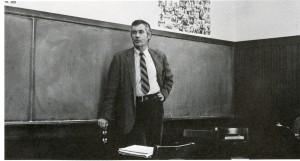
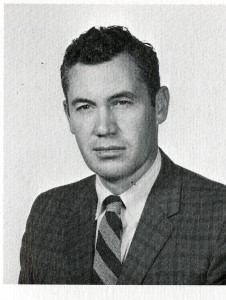
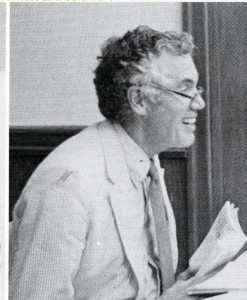
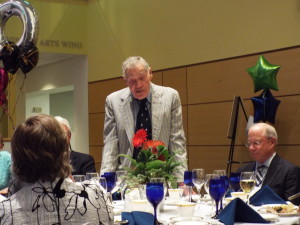
One edit:
Richard H. Van Kleeck
Nobles 1945.
A favorite and great teacher. I got so:much from him